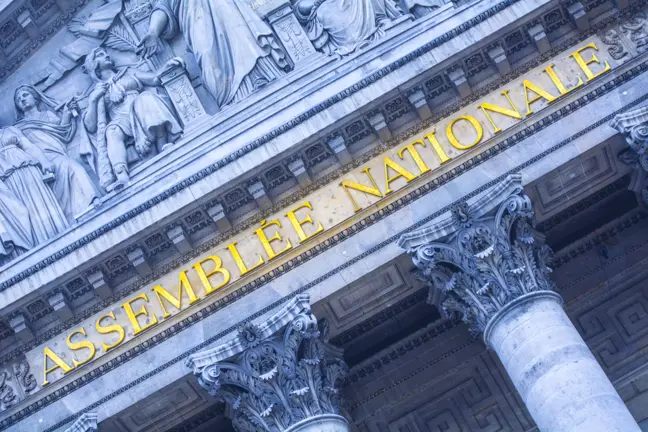Summary
The fragmentation of votes into irreconcilable political blocs with no absolute majority creates a political situation unprecedented under the Fifth Republic. Financial markets do not seem to be concerned in the short term, but the absence of a clear policy stance could have consequences in the medium term.
What are the key takeaways?
The results of the second round of parliamentary elections represent a huge setback for Ensemble, the movement that supports Emmanuel Macron. The presidential party won only 245 seats in the National Assembly, losing the absolute majority it had previously held (including the dissidents). Ensemble will need 44 additional members to reach the 289 majority threshold. Reaching this won't be easy. The unprecedented situation in the Fifth Republic paves the way for a complex and uncertain political phase.
Indeed, this second round, with a record low turnout (46%), gave 131 seats to the leftist NUPES coalition, which campaigned against Emmanuel Macron's liberal policies during his first term and his programme for the next five years. Although across this heterogeneous group, composed of the extreme left, environmentalists and socialists, some MPs may eventually join the presidential movement, it is unlikely that many will rally to it in the short term. It is not clear whether this movement formed for the purpose of these parliamentary elections will become a parliamentary group as such. The second big surprise was the important scoring of the Rassemblement National (RN), which, with 89 seats, is in a strong position to become a key element of the opposition. Ironically, the Les Republicains-UDI group has been losing momentum since 2017, with 64 of its members elected. This is the majority in the Senate and thus currently the only potential ally for Ensemble. Nevertheless, its leaders have expressed the wish to remain in opposition.
The coming weeks will be crucial. On Wednesday, 29 June, the 22 members of the Assemblée Nationale Bureau will be appointed, and on 30 June, the eight permanent commissions will be constituted, including the strategic Finance Commission. It has a very broad remit and deals with the tax and financial aspects of legislation. It has special powers in the field of budgetary control and assesses the financial admissibility of legal amendments. The tradition since the period during which Nicolas Sarkozy led the government is that the Finance Commission is chaired by an opposition leader. So, firstly, if RN is the main opposition party, it is likely to demand this function, likely leading to strong opposition to the government’s fiscal choices. Secondly, on 5 July, the appointed Prime Minister will make a general policy statement, after which it is also a tradition that a vote of confidence follows. At this point, it seems difficult that a confidence vote will be successful given such a divided assembly. This will make it difficult for the government to pass all the significant legislation it plans.
The market response has been broadly limited. The stock indices and interest rates for French Treasury (OAT) bonds have moved slowly on this news, indicating that the markets are not overly concerned about the situation. Moreover, a new phase of fiscal and consumption support could be announced quickly. This will boost domestic demand and thus equities. However, a possible political gridlock and, above all, the absence of major long-term reforms could affect the fiscal trajectory and thus the sustainability of French debt in the context of higher interest rates and tighter financial conditions.
What will the consequences be regarding France’s social climate? Sunday's result illustrates the polarisation of the French political landscape and society, but also the rejection of policy that is not perceived to address the concerns of the French people. The parties agree on the priority to be given to purchasing power but differ substantially on the solutions to be provided. It is therefore not clear that even on shared objectives the parties could agree and pass a law. The ecological transition, also a collective priority, seems more difficult to achieve. NUPES itself is divided on the future of nuclear power. As for pension reform, it is very likely that this will be postponed in order to avoid a public outcry. So, it cannot be ruled out that the solution if no majority emerges would be to call the voters back to the polls...
While the political context seems intractable in the short term, it is important to emphasise that state institutions and stability are not challenged by this unprecedented result. Indeed, the President of the Republic has very broad prerogatives in relation to sovereignty matters (security, foreign affairs, appointments) and some policies can be decided by decree. France’s action on the international scene in particular should not be disrupted. Nevertheless, technical solutions, such as the use of Art 49.3 or executive orders, will not allow ambitious policy changes and may cause France to lag behind in many economic areas. Let us hope that the period of shock passes quickly and that politicians can find a way through what already looks like a historical political crisis.
Definitions
- Basis points: One basis point is a unit of measure equal to one one-hundredth of one percentage point (0.01%).
- Cyclical vs. defensive sectors: Cyclical companies are companies whose profit and stock prices are highly correlated with economic fluctuations. Defensive stocks are less correlated to economic cycles. Cyclicals sectors are consumer discretionary, financial, real estate, industrials, information technology, and materials, while defensive sectors are consumer staples, energy, healthcare, telecommunications services, and utilities.
- Quantitative easing (QE): QE is a monetary policy instrument used by central banks to stimulate the economy by buying financial assets from commercial banks and other financial institutions.
- Spread: The difference between two prices or interest rates.


